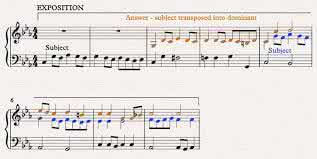Znaczenie słowa fugue po polsku
Co oznacza fugue po angielsku? Poznaj znaczenie, wymowę i specyficzne użycie tego słowa z Lingoland
fugue
US /fjuːɡ/
UK /fjuːɡ/

Rzeczownik
1.
fuga
a contrapuntal compositional technique in two or more voices, built on a subject (theme) that is introduced at the beginning in imitation and which recurs frequently in the course of the composition.
Przykład:
•
Bach's 'Toccata and Fugue in D minor' is a masterpiece of classical music.
„Toccata i Fuga d-moll” Bacha to arcydzieło muzyki klasycznej.
•
The composer skillfully wove multiple melodic lines into a complex fugue.
Kompozytor zręcznie wplótł wiele linii melodycznych w złożoną fugę.
2.
fuga, fuga dysocjacyjna
a state or period of loss of awareness of one's identity, often coupled with flight from one's usual environment, associated with certain forms of hysteria and epilepsy.
Przykład:
•
After the traumatic event, the patient experienced a dissociative fugue, wandering far from home.
Po traumatycznym wydarzeniu pacjent doświadczył fugi dysocjacyjnej, błąkając się daleko od domu.
•
The doctor diagnosed him with a psychological fugue state.
Lekarz zdiagnozował u niego psychologiczną fugę.
Synonim: